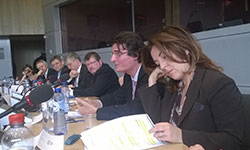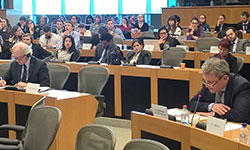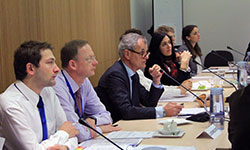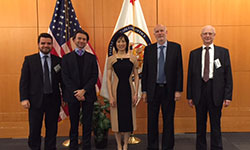BusinessEurope Headlines No. 2016-07
Acceleration on TTIP during 12th negotiating round
 "This year a political agreement should be reached on the Transatlantic Trade and Investment Partnership that clearly identifies landing zones including for the most sensitive areas, but without lowering our expectations or the level of ambition", Director General Markus J. Beyrer told chief negotiators at a breakfast event BusinessEurope hosted on 23 February. Daniel Mullaney and Ignacio Garcia Bercero highlighted their strong commitment to an acceleration of the process to allow for conclusion of a political agreement by the end of the year. Pat Ivory, chairman of our US Network, represented BusinessEurope at the roundtable discussion to mark the launch of "Four Sectors, Many Stories, One Ambition – Leading UK industries make the case for TTIP", an event jointly organised by British American Business and the UK Representation to the EU which focused on the potential benefits for small and medium-sized enterprises. Finally, at the TTIP stakeholder event on 24 February, Eleonora Catella said that regulatory cooperation is above all a process: an obligation for regulators to cooperate must be provided for in the agreement by means of a detailed framework with clear deadlines.
"This year a political agreement should be reached on the Transatlantic Trade and Investment Partnership that clearly identifies landing zones including for the most sensitive areas, but without lowering our expectations or the level of ambition", Director General Markus J. Beyrer told chief negotiators at a breakfast event BusinessEurope hosted on 23 February. Daniel Mullaney and Ignacio Garcia Bercero highlighted their strong commitment to an acceleration of the process to allow for conclusion of a political agreement by the end of the year. Pat Ivory, chairman of our US Network, represented BusinessEurope at the roundtable discussion to mark the launch of "Four Sectors, Many Stories, One Ambition – Leading UK industries make the case for TTIP", an event jointly organised by British American Business and the UK Representation to the EU which focused on the potential benefits for small and medium-sized enterprises. Finally, at the TTIP stakeholder event on 24 February, Eleonora Catella said that regulatory cooperation is above all a process: an obligation for regulators to cooperate must be provided for in the agreement by means of a detailed framework with clear deadlines.
Contact: Luisa Santos or Eleonora Catella
A strong industry will bring growth, employment and innovation to the EU
 "A robust industrial platform in Europe is an indispensable basis to solve current European challenges. Stepping up the efforts to improve Europe's industrial competitiveness is therefore absolutely essential", BusinessEurope Director General Markus J. Beyrer said at the high-level industrial conference "future perspective industry 2030" in Berlin on 18 February. He also stressed that industrial competitiveness must be the core of the EU policy agenda to bring industry's weight in the EU GDP back to 20% by 2020, from around 15% today. The conference was organised by the German Ministry for Economic Affairs and the Alliance Future Industry. It welcomed German Vice-Chancellor Sigmar Gabriel, European Commissioner Šefčovič and BDI President Grillo as well as representatives from industry, politics, civil society and diplomacy.
"A robust industrial platform in Europe is an indispensable basis to solve current European challenges. Stepping up the efforts to improve Europe's industrial competitiveness is therefore absolutely essential", BusinessEurope Director General Markus J. Beyrer said at the high-level industrial conference "future perspective industry 2030" in Berlin on 18 February. He also stressed that industrial competitiveness must be the core of the EU policy agenda to bring industry's weight in the EU GDP back to 20% by 2020, from around 15% today. The conference was organised by the German Ministry for Economic Affairs and the Alliance Future Industry. It welcomed German Vice-Chancellor Sigmar Gabriel, European Commissioner Šefčovič and BDI President Grillo as well as representatives from industry, politics, civil society and diplomacy.
Contact: Dominik Futschik
Photo © BMWi/Maurice Weiss
Harnessing the job potential of digital transformation
 The European Commission should conceive its employment policy agenda in a way that underpins the digital transformation of our economies and labour markets. It should contribute to maximise employment opportunities that can derive from digitalisation of our economies as part of a renewed European strategy on flexicurity. This was the key message by BusinessEurope Social Affairs Director Maxime Cerutti during a meeting convened by Commission Vice-President Andrus Ansip on 18 February to discuss the digital single market and its impact on jobs with the European social partners. Digitalisation has the potential to lead to job creation. Some existing jobs and areas of activity will evolve; some jobs will disappear, but new activities will be created. How far digitalisation will ultimately increase employment depends on the timely and effective adaptation of skills policies, labour market regulations and institutions, as well as work organisation.
The European Commission should conceive its employment policy agenda in a way that underpins the digital transformation of our economies and labour markets. It should contribute to maximise employment opportunities that can derive from digitalisation of our economies as part of a renewed European strategy on flexicurity. This was the key message by BusinessEurope Social Affairs Director Maxime Cerutti during a meeting convened by Commission Vice-President Andrus Ansip on 18 February to discuss the digital single market and its impact on jobs with the European social partners. Digitalisation has the potential to lead to job creation. Some existing jobs and areas of activity will evolve; some jobs will disappear, but new activities will be created. How far digitalisation will ultimately increase employment depends on the timely and effective adaptation of skills policies, labour market regulations and institutions, as well as work organisation.
Contact: Maxime Cerutti
Acknowledge businesses as strategic stakeholders
 Businesses apply standards to achieve conformity with legislation. As a result, the European standardisation system has been successfully supporting the single market in goods for over three decades. However, continuation of success is increasingly under pressure due to the top-down approach at which it now operates. Paul Coebergh van den Braak, Chair of BusinessEurope’s Free Movement of Goods Working Group, presented this message to the European Parliament at a single market strategy hearing on 23 February. The ‘joint initiative on standardisation’ has the potential to ensure standards continue to support the single market through a bottom-up approach if it can enable an earlier strategic dialogue with business.
Businesses apply standards to achieve conformity with legislation. As a result, the European standardisation system has been successfully supporting the single market in goods for over three decades. However, continuation of success is increasingly under pressure due to the top-down approach at which it now operates. Paul Coebergh van den Braak, Chair of BusinessEurope’s Free Movement of Goods Working Group, presented this message to the European Parliament at a single market strategy hearing on 23 February. The ‘joint initiative on standardisation’ has the potential to ensure standards continue to support the single market through a bottom-up approach if it can enable an earlier strategic dialogue with business.
Read more or contact: Patrick Grant
ETS reform: striking the right balance on free allocation
 "European leaders have agreed that best performers should not face undue carbon costs leading to carbon leakage. However, the European Commission proposal to reform the EU emissions trading scheme foresees a deficit in free allowances that will generate a cost even for the most efficient installations. Therefore striking the right balance on free allocation is crucial for industry’s competitiveness", Olivier Imbault, Chair of BusinessEurope’s Energy and Climate Working Group, stressed on 23 February at a working breakfast organised with member state representatives to exchange views and get their feedback on their positions regarding the future of the scheme.
"European leaders have agreed that best performers should not face undue carbon costs leading to carbon leakage. However, the European Commission proposal to reform the EU emissions trading scheme foresees a deficit in free allowances that will generate a cost even for the most efficient installations. Therefore striking the right balance on free allocation is crucial for industry’s competitiveness", Olivier Imbault, Chair of BusinessEurope’s Energy and Climate Working Group, stressed on 23 February at a working breakfast organised with member state representatives to exchange views and get their feedback on their positions regarding the future of the scheme.
Read more or contact: Alexandre Affre
A strong investment protection mechanism should be created before intra-EU BITs are terminated
 There is an ongoing debate on the abolishment of intra-EU bilateral investment treaties (BITs), which are agreements in principle concluded between older and newer EU member states. But if these agreements are terminated, would European investors be strongly and adequately protected under the provisions currently included in the single market, in particular in the absence of a dispute settlement mechanism at the EU level? It is our view that the existing framework is not clear or harmonised, which often results in the discriminatory treatment of investors within the EU. BusinessEurope raises these concerns in a letter to the European Commission, proposing that intra-EU bilateral investment treaties should remain in place until an appropriate dispute settlement mechanism is created at the EU level. This mechanism should be efficient in time and costs, effective in the conduct of procedures and enforcement of the decisions, impartial and transparent, however respecting sensitive information. BusinessEurope will continue to engage constructively in the discussions on this issue.
There is an ongoing debate on the abolishment of intra-EU bilateral investment treaties (BITs), which are agreements in principle concluded between older and newer EU member states. But if these agreements are terminated, would European investors be strongly and adequately protected under the provisions currently included in the single market, in particular in the absence of a dispute settlement mechanism at the EU level? It is our view that the existing framework is not clear or harmonised, which often results in the discriminatory treatment of investors within the EU. BusinessEurope raises these concerns in a letter to the European Commission, proposing that intra-EU bilateral investment treaties should remain in place until an appropriate dispute settlement mechanism is created at the EU level. This mechanism should be efficient in time and costs, effective in the conduct of procedures and enforcement of the decisions, impartial and transparent, however respecting sensitive information. BusinessEurope will continue to engage constructively in the discussions on this issue.
Read more or contact: Sofia Bournou
New rules for digital contracts: what is needed to make it work
 When it comes to business-to-consumer digital contracts, BusinessEurope is in favour of creating a better level playing field. The current framework is still fragmented, deterring businesses and consumers to enter cross-borders transactions. However, harmonisation should not be carried out at any cost. The recent European Commission proposals need to provide a balanced level of protection as well as coherent rules and scope to trigger meaningful change. These messages were conveyed by Pedro Oliveira, Senior Adviser at BusinessEurope, during the European Law Academy conference on new rules for digital contracts in Brussels on 18 February.
When it comes to business-to-consumer digital contracts, BusinessEurope is in favour of creating a better level playing field. The current framework is still fragmented, deterring businesses and consumers to enter cross-borders transactions. However, harmonisation should not be carried out at any cost. The recent European Commission proposals need to provide a balanced level of protection as well as coherent rules and scope to trigger meaningful change. These messages were conveyed by Pedro Oliveira, Senior Adviser at BusinessEurope, during the European Law Academy conference on new rules for digital contracts in Brussels on 18 February.
Contact: Pedro Oliveira
Geo-blocking: focus on remaining fragmentation in the single market first
 While addressing unjustified geo-blocking in the coming weeks, the European Commission must acknowledge that justified reasons for different treatment exist, such as diverse market conditions or different national regulations. The Commission should assess these reasons on a case-by-case basis and must not limit contractual freedom for companies further. This is the message conveyed on 18 February by Cecilia Zappalà, Adviser at BusinessEurope, during a single market workshop on geo-blocking in Amsterdam. The workshop was organised by the European Commission to discuss various policy options that will result in a legislative proposal to be tabled in the coming weeks. Instead of putting extra burdens on companies, BusinessEurope calls on the Commission to focus on tackling different treatment at the root, namely addressing challenges to online and offline trade across borders and remaining fragmentation in the single market.
While addressing unjustified geo-blocking in the coming weeks, the European Commission must acknowledge that justified reasons for different treatment exist, such as diverse market conditions or different national regulations. The Commission should assess these reasons on a case-by-case basis and must not limit contractual freedom for companies further. This is the message conveyed on 18 February by Cecilia Zappalà, Adviser at BusinessEurope, during a single market workshop on geo-blocking in Amsterdam. The workshop was organised by the European Commission to discuss various policy options that will result in a legislative proposal to be tabled in the coming weeks. Instead of putting extra burdens on companies, BusinessEurope calls on the Commission to focus on tackling different treatment at the root, namely addressing challenges to online and offline trade across borders and remaining fragmentation in the single market.
Contact: Cecilia Zappalà
Developing industrial platforms is key to a successful European digital transformation
 Developing leadership in open digital platforms for industry is a key priority for the upcoming EU digital transformation strategy. On 17 February Marc Vancoppenolle, Vice-Chair of BusinessEurope’s Digital Economy Taskforce, presented our main recommendations at European Commissioner Oettinger’s roundtable on industrial platforms. Platforms should mainly be created by industry, integrating - where appropriate - multiple value chains in different sectors, while ensuring interoperability, portability of applications and a level playing field. A high degree of data protection and security must be ensured. Europe needs to refrain from a top-down approach and help set the right environment to reap the full benefits of digitalisation.
Developing leadership in open digital platforms for industry is a key priority for the upcoming EU digital transformation strategy. On 17 February Marc Vancoppenolle, Vice-Chair of BusinessEurope’s Digital Economy Taskforce, presented our main recommendations at European Commissioner Oettinger’s roundtable on industrial platforms. Platforms should mainly be created by industry, integrating - where appropriate - multiple value chains in different sectors, while ensuring interoperability, portability of applications and a level playing field. A high degree of data protection and security must be ensured. Europe needs to refrain from a top-down approach and help set the right environment to reap the full benefits of digitalisation.
Contact: Guido Lobrano
Industry and patent offices confirm commitment to international cooperation
 BusinessEurope and its partners from the United States and Japan had their annual meeting with the US, Japanese and European patent offices in Washington during the week of 22 February 2016. Progress was made on discussions to harmonise patent laws. Business representatives and patent offices also took stock of their ongoing cooperation projects to simplify and harmonise patent procedures to the benefit of users of the global patent system.
BusinessEurope and its partners from the United States and Japan had their annual meeting with the US, Japanese and European patent offices in Washington during the week of 22 February 2016. Progress was made on discussions to harmonise patent laws. Business representatives and patent offices also took stock of their ongoing cooperation projects to simplify and harmonise patent procedures to the benefit of users of the global patent system.
Contact: Ilias Konteas
A pro-innovation approach must drive Europe’s digital economy agenda
 Implementation of the digital single market strategy was discussed with Claire Bury, Deputy Director-General at DG CONNECT during BusinessEurope’s Digital Economy Taskforce meeting on 17 February. Companies expressed the need to ensure consistency between the various proposals that the European Commission will table in the context of the digital single market strategy and to avoid one-size-fits-all solutions in any initiative on platforms. It is essential to adopt a flexible, pro-innovation approach aiming at solving the existing problems rather than creating unnecessary rules. BusinessEurope expressed its determination to remain involved and provide input to the Commission activity in this field.
Implementation of the digital single market strategy was discussed with Claire Bury, Deputy Director-General at DG CONNECT during BusinessEurope’s Digital Economy Taskforce meeting on 17 February. Companies expressed the need to ensure consistency between the various proposals that the European Commission will table in the context of the digital single market strategy and to avoid one-size-fits-all solutions in any initiative on platforms. It is essential to adopt a flexible, pro-innovation approach aiming at solving the existing problems rather than creating unnecessary rules. BusinessEurope expressed its determination to remain involved and provide input to the Commission activity in this field.
Contact: Jérôme Chauvin
Calendar
 29 February: Competitiveness Council meeting
29 February: Competitiveness Council meeting- 3 March: BusinessEurope Day
- 4 March: Environment Council meeting
- 5 March: parliamentary elections in Slovakia
Contact: BusinessEurope Headlines